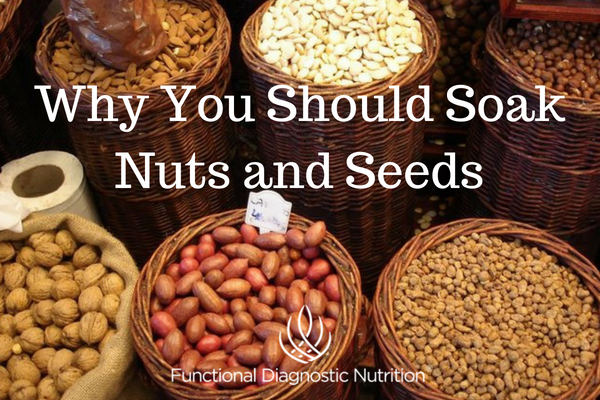Photo credit: Freeimages.com/kragmel
Do you soak nuts and seeds before eating them, and why is that important?
When a Functional Health Coach works with a client, one of thing things that is always a part of their health protocol is making necessary changes to their diet to allow their body to receive much needed nutrients and to remove toxins. Due to digestive issues, many clients find that switching to a grain free, gluten free, Paleo or Primal diet helps them to feel better more quickly, and often eases digestive distress. There is one common denominator with all of these different diets…they are all typically high in nuts and seeds.
Nuts and seeds actually do have some great health benefits, such as:
- Lowering the risk of heart disease
- Reducing inflammation
- Boosting the immune system
- Can help you to feel full longer after a meal
- Helps support brain function
- Can reduce your risk of cancer
- Increases energy
- Support bone health
Nuts and seeds are packed with vital nutrients that the body needs. They are high in protein, rich in Omega 3 fatty acids, high in beneficial minerals such as magnesium, zinc, selenium and manganese as well as B vitamins.
But despite being so rich in nutrients, there are some drawbacks to eating nuts that must be addressed in order to utilize the nutrients in nuts and seeds effectively. Nuts and seeds contain a compound called phytic acid, which protects the nut or seed until it is able to be germinated. The phytic acid prevents nutrients from within the nuts and seeds from being absorbed by the body and causes them to be more difficult to digest, causing digestive upset for some people. Nuts and seeds also contain enzyme inhibitors. These inhibitors help to prevent each nut and seed from sprouting prematurely. But problems occur when eating them, because enzyme inhibitors bind with vital nutrients in the body, rendering them unavailable for biological functioning and ultimately leading to nutrient deficiencies.
The good news is that there is a simple way to minimize both phytic acid and enzyme inhibitors in nuts and seeds. Traditional cultures have been soaking and drying nuts and seeds for thousands of years in order to naturally increase the bioavailability of nutrients, as well as to neutralize phytic acid and enzyme inhibitors, making them more digestible. It’s simple to do that at home as well.
What you will need:
- A large bowl
- Filtered water
- Sea salt
What you need to do:
- Place 2-4 cups of raw nuts into the bowl.
- Pour in enough filtered water so that the nuts are completely submerged.
- Add 1-2 tablespoons of sea salt.
- Allow the bowl to sit out on the counter for at least 7 hours (doing this overnight works well, and you can soak them for up to 24 hours).
- Drain and rinse in colander.
- Add to a large baking sheet or a dehydrator sheet.
- Bake in the oven or dehydrator at no higher than 150 F until completely dry.
Be aware that this process can take from 12-24 hours to complete in order for the nuts to dry fully. Without drying fully, it is easy for mold or fungus to grow, so any wet nuts would have to be used or consumed quickly before spoiling.
Once dry, you will find that the nuts have a nice crispy texture to them. If you want to use your soaked nuts in an almond or cashew milk, the perfect time to do that is before drying them, while they are still soft!
Two seeds that you shouldn’t soak are chia and flaxseed. Both of these seeds gel when wet, and so it is difficult to complete a soaking and drying process.
If you don’t wish to soak and dry seeds and nuts, you can now find many varieties to purchase online that have been both soaked and sprouted for optimal bioavailability of nutrients. Even some large natural grocery chains are carrying soaked and sprouted nuts and seeds, giving you even more options.







